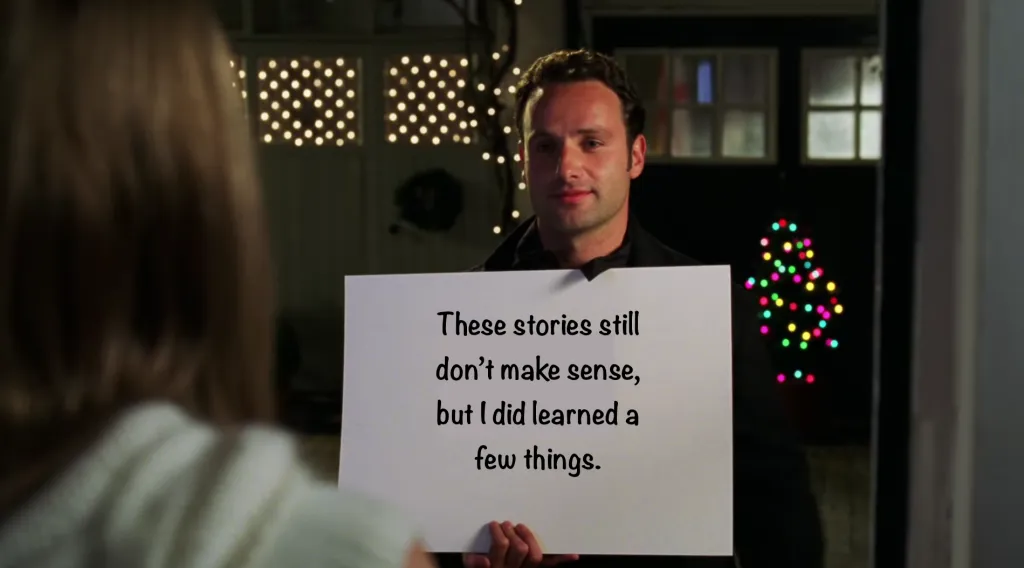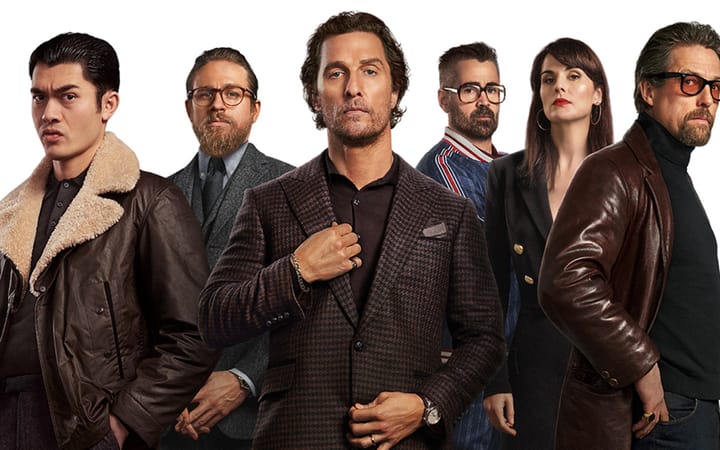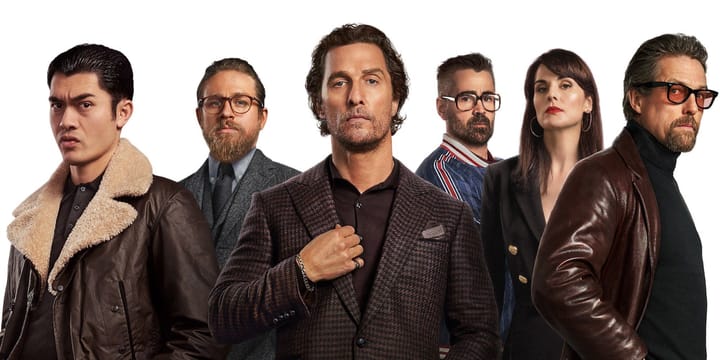Revisiting, Actually is a Good Idea
Love Actually is not a great movie. That may not be a common or popular take, but that is the truth.

Love Actually is not a great movie. That may not be a common or popular take, but that is the truth. Now while I enjoy being a contrarian and don’t often see eye to eye with a lot of popular consensus in the cultural zeitgeist (though I have softened over the years), I try very hard to give everything I watch and consume, a fair shake. Though I am no different from any other person and acknowledge that objectivity is no easy skill to apply in every circumstance.
And it is with this idea in mind that I decided, with nearly two decades of eye-rolling whenever I hear this movie mentioned around the holidays, that I would give Love Actually a second chance. I would go into it as open as possible to reconsider my long held take that it is an irritating, self-indulgent, pandering movie that uses cleverness as a cloak of truthfulness of what love actually is.
It feels harsh writing that, as I don’t like to bag on movies just because I don’t like them, at least not publicly. Generally speaking, I can not like a movie because it doesn’t fit my tastes, but still understand why certain audiences enjoy it.
This is not a movie I understand the affection for, and what may be a large factor in my reaction, is the disproportionate consideration of this movie as a classic. Most times when something is mystifyingly popular but irritates you, you can still shake it off and not give it any time or energy. This is not one of those times.
What I’ll give it credit for is its use of character association, with the ensemble crossover storylines to give different points of view of a layered connect such as ‘love’. While it misses the mark on its context of its topic, I enjoy this story tool. Giving multiple perspectives of a topic that many people experience differently, allows for a greater connection and exploration with your audience. And having an ensemble cast that makes each story line feel important without a centering ‘A’ story is a fun and different form from a more traditional story.
The use of an ensemble is a great tool to covey the idea that everyone is fighting their own battles, layered as both the protagonist of their story and the supporting character in other’s stories. It’s a great perspective on life as we all many hats in our daily lives, and one that I have a deep connection with.
I hope that my like of this story structure will keep me open to reevaluating my opinion of the other aspects of the movie during my rewatch.
Spoiler alert, it did not.
But that’s okay because I actually got value of rewatching a movie I still disliked.
First off, I got to be a critic. Like peanut gallery critic. Pretty early on, I realized that my conception of this movie has not changed, nor likely will it. So I got to have fun with it. While I prefer to understand a movie and its filmmakers' intentions, sometimes it’s fun to just let it rip. Now this movie isn’t awful, it’s just not that good. So the quips and sarcasm are all in good fun. Even if (or especially because) my wife disagrees.
But putting aside the dark joy of critiquing someone’s work, there is actual value that helps me grow as a writer and a viewer. One of the main benefits is expanding the scope of the types of stories I enjoy, which can help me create more interesting and dynamic stories.
Everyone has tastes and preferences in the content that they consume that is both learned and influenced by the world (both big and small) around us. But one of the best changes I’ve made over the years, was opening myself to a wider variety of genres and types of content that I consume. In the past, I was more closed-minded, only search out ‘good’ movies, dismissing silly or absurd movies. But I couldn’t help notice how much fun people had with less ‘artistically pure’ films, and I gradually gave them a second chance, and have grown to enjoy them. I’m better for it and entertained by more movies.
Rewatching Love Actually is a part of this process. The last time I’d seen it in full was probably 15 years ago, when my tastes were narrow and criticism was immature. And while I have a better grasp and understanding of genres, I still put that into practice of rewatching shows that I normally have a negative feeling towards and give them a second chance.
The Fast and Furious films are a prime example where I used to think they're ridiculous and over the top, but now having rewatched them, that's exactly how they're intended to be, and now this is one of my favorite film series because of their gratuitous spectacle nature.
But this doesn’t mean that I don’t still have preferences or accept all movies as fine or decent. They still have to do the work and meet their intention. I still watch enough movies that I don’t like, many times because their intention is unclear. I don’t understand why I am watching this or what it is trying to say. (And not the thing they actually say, I mean the subtext.)
While I didn’t change my mind on Love Actually, I still got validation out of knowing that my original critique was solid then. While I’ve expanded my perspectives to accept more types of movies, I still have a strong sense of what I like and don’t like (or what my preferences are.)
That said, it also kept me honest about my criticisms. While critiquing the movie, I’m observing myself, also critiquing my judgements as any given moment. Am I being overly critical, am I only looking throughly life perspective, am I putting myself in the filmmaker's shoes to understand their choices and motivations? Do I see what they are intending to convey, even if the execution is off ?
I’ve learned over the years to appreciate the effort, choices, and consideration that went into creative works (especially communal efforts like performance art) even if I don’t like it or think that it was good. That way, when I truly don’t like something, I am able to articulate it and have sound reasoning for my feelings. Occasionally, it works in the opposite, where I know something isn’t good, but I love it anyway.
But developing this understanding, to me, is crucial too warding off the worst inclination in life— cynicism, which is the death of enjoyment.
There are also practical value out of rewatching this movie. It helps me hone my skills as a writer and storyteller. From a better grasp of this genre’s frameworks to insights of its resonance with certain audiences to recognizing trends in writing. As a writer, I have to understand what works for audiences, what clicks for them, both in a base story writing and in genre aspects. Just because I don’t write rom-com, doesn’t mean I can’t incorporate (or avoid) aspects of it in my stories. Even in a film that I am overly critical of, like Love Actually, I still find small moments to enjoy and learn from.
One fascinating bit is observing storytelling trends and techniques from years past and taking note of how storytelling has evolved since then. You notice some aspects hold up well, while many parts don’t. Others were of their time and still work, but now seem quaint or have the impact.
By taking notice of these techniques, you learn the areas that are tried and true foundations of story telling that were crucial before, then in the present, and now in the future. While I found many parts of this movie frustrating and lacking, there were many times that the approach was right for the moment, pushing the traditional practice further, evolving it. But for each genuine moment of honest writing, it used cheap ‘clever’ tricks to elicit an intended emotion. Many times, I was caught wondering why they didn’t just use a certain moment in a slightly different but obvious way that could have hit home the intention much stronger.
But regardless of the specifics, this rewatching engaged my critical thinking on many different levels. These moments mentioned here are by no mean exhaustive of the value one can get from rewatching old (or new) movies. The most important thing is still just reliving that feeling of joy and connection a movie or TV show can bring you.
Being able to rewatch movies is the great privilege of our modern time. Not only is it fantastic to be able to revisit the stories and characters that you love, but also to give the ones you didn’t a second chance. It’s not guaranteed that you’ll change your mind, as this case shows, but it’s in the opportunity to reevaluate your feelings that is special, which in turn you can learn a great deal about yourself.





Comments ()